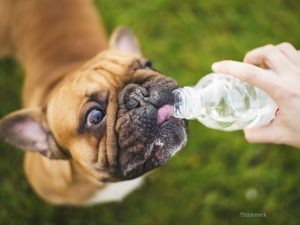Heat Stroke Is No Joke For Your Pet
 Summer. For you it may mean laying by the pool or going on a vacation. For pets, their fur can be a problem. Heat stroke is a major risk associated with pet ownership. Heat stroke is caused by the hot summer temperatures and your pets’ core temperature will rise; typically 105 degrees fahrenheit or higher.
Summer. For you it may mean laying by the pool or going on a vacation. For pets, their fur can be a problem. Heat stroke is a major risk associated with pet ownership. Heat stroke is caused by the hot summer temperatures and your pets’ core temperature will rise; typically 105 degrees fahrenheit or higher.
The most common cause of heat stroke is leaving your pet in a parked car. Contrary to popular belief, “cracking a window” is not sufficient enough to save your pet from this potentially deadly problem. Even if the temperature is moderate, the interior of a car rises, regardless of outside temperature. The American Veterinary Medical Association (AVMA) urges pet owners to “love ’em and leave ’em.” This means to leave your pets at home. “They’ll be safe and happily waiting for you to come home.”
Other causes of heat stroke in pets include exercising too much on humid days or not being able to get out of the sun while outside. You can prevent heat stroke by keeping pets inside on extremely hot days. Some pets are predisposed to heat stroke by the way they look. If they have extremely flat or shortened faces, such as persian cats or pugs, they cannot pant as effectively. These pets, along with the overweight, elderly, and those with heart or lung disease should be kept indoors in air-conditioned rooms as often as possible during the heat of summer. Other ways to prevent heat stroke is having cold water easily accessed and giving your dog a cool bath.
Heat stroke is identifiable by several signs. These include:
- Excessive or rapid panting
- Bright red tongue,
- Red or pale gums,
- Thick or sticky saliva,
- Weakness,
- Dizziness,
- Vomiting,
- Shock
- Sometimes coma
If you find your pet suffering from these symptoms, you should remove your pet from the hot area immediately. Before taking your pet to the veterinarian, lower his temperature by cooling them with cool water or towels and increasing air movement around your pet with a fan. It is important to use cool water because very cold water can be counterproductive. It may lower their temperature too quickly causing other life-threatening medical problems. When your pets core temperature has lowered, bring them to their vet immediately.
The summer has plenty of opportunities for fun in the sun. Just be sure to let the fun pause and allow your pet, and you, to rehydrate and rest in an air-conditioned room.
For more information about Dr. Olsen and his practice, please visit his website or follow him on Facebook.
